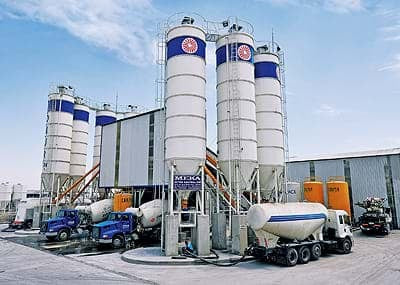For civil engineers, access to high-quality, high-performance concrete is essential to building successful, long-lasting projects. Therefore, a reliable and efficient concrete mixing plant can be of great benefit. In this blog article, we explore the world of concrete batching plants and their benefits for civil engineers and discuss how they can help plan and execute successful projects.
When working on a civil engineering project, concrete is one of the most important materials you will use. It is strong, durable and versatile, making it ideal for a wide range of applications. To ensure the success of your projects, it is important to have access to quality concrete. One of the best ways to ensure this is to have your own concrete batching plant.
A concrete batching plant is a facility that produces concrete in batches. This allows for the mass production of concrete, which is then delivered to construction sites. Having your own concrete mixing plant can be a huge benefit for several reasons.
First, it can help improve the quality of the concrete you use. When you have your own concrete mixing plant, you have greater control over the ingredients used and the manufacturing process. This can result in a higher quality, more durable and functional product.
Secondly, having your own concrete mixing plant can help reduce costs. Instead of buying concrete from others, you can do it yourself. This can result in significant savings that can be passed on to the customer.
Finally, having your own concrete batching plant can help improve the efficiency of your project. Once you have your concrete, you can have it delivered to the site when needed, rather than having to wait for delivery from a concrete supplier. This can help keep your project on schedule and on budget.
Overall, having your own concrete mixing plant can be of great benefit to civil engineers. It can help improve concrete quality, reduce costs and increase project efficiency. If you are working on a civil engineering project, it is worth considering investing in a concrete batching plant.


Types of concrete batching plants
There are different categorizations for concrete batching plants. Depending on the mixing method, the options for relocating from one location to another or stationary concrete mixing plants can often be divided into categories.
Let's discuss each type of plant in detail.
Stationary concrete mixing plants
As the name suggests, stationary concrete batching plants are not mobile and are generally positioned to cover a specific area or project. We build the stationary concrete mixing plant with the following requirements.
- High demand for concrete. This may be an area where there is no possibility of obtaining sufficient concrete in a reasonable time and at a reasonable cost.
- If the construction site is very large and large quantities of concrete are required, construction needs can be met much more easily if a concrete batching plant is installed at the construction site.
- Even though the concrete mixing is done laterally, it is very simple, the concreting can be planned independently, without depending on third parties. Construction can be carried out without much difficulty.
With the above facts, stationary mixing plants are very reliable and accurate. As all adjustments are made in the respective Mix Project, a more accurate result would be obtained.
All necessary materials such as cement, aggregates, water and other additives are stored near the concrete plant. This allows concrete to be produced more effectively.
Mobile concrete mixing plant
Mobile mixing plants are used in construction sites where they need to be transported from one location to another. The mixing center is equipped with wheels so it can move. The equipment is only needed for specific, short project phases, making mobile mixing plants ideal for construction sites or temporary projects.
Mobile concrete systems require relatively little setup or preparation before use as they are easy to assemble and disassemble. To ensure quick installation on site, mobile concrete batching plants are pre-wired and supplied with all necessary equipment. Installing a typical mobile system takes 1 to 2 days.


Dry concrete dosage
Dry concrete plant is also known as transit mixing plant. This type of concrete mixing machine is more suitable when the concrete batching plant is not so close.
The material is weighed on a digital or manual scale. All materials are loaded into the truck through the unloading chute. Generally, the weight of water is measured or the volume is taken into consideration for addition to the mixing car.
The ingredients are mixed on the way to the location and mixed at least 70-100 times on the way there.
Wet concrete mixing plant
Wet mix plants are easy to install and transport from one location to another. There are two types of wet mix plants.
- Stationary type
- Type of cell phone
If you have a lot of construction projects to do and they are spread over a large area, you may want to invest in several small fixed wet mix plants. Alternatively, you can opt for a large mobile wet mix plant that can be dismantled once the project is complete and then moved to another location.
Application of a concrete mixing plant
The main application of the concrete batching plant is the production of ready-mixed concrete. The production of ready-mixed concrete is one of the main areas of construction. Civil construction involves concreting work and the type of concrete most used today is pre-mixed concrete.
For more information, see the Ready-made concrete article.
Ready-mix concrete is also often used in other construction methods such as precast concrete construction, etc.

